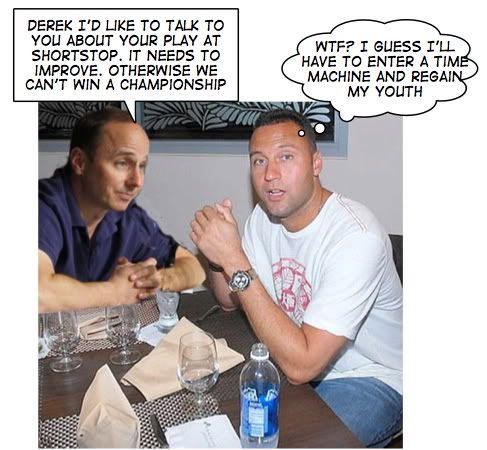Has anyone read the Ian O'Connor biography of Jeter?
Sports Illustrated had an excerpt
Brian Cashman had a more pressing on-field problem with a player who was not among George Mitchell's traveling all-stars: Derek Jeter. His defense was hurting the Yankees, and Cashman decided to do something about it.......
My old teammate Lyn Lary had these comments:
typical bs from The Office Boy. Note, please, how he manages to get in the idea that it was he and he alone who argued for Jeter to go into the lineup in 1996. The guy really is a master propagandist.
If you examine this story closely, though, the whole thing makes no sense—and also speaks to the basic inanity of fielding statistics.
So, Cashman had a dinner with Jeter to tell him that he’d lost a step or two? And should correct it? How do you do that, exactly? Invent a time machine?
And note, too, how the gist of the tale changes midway through. Originally, Cashman’s having dinner with Jeter to try to raise the idea of him playing elsewhere—something that makes more sense. Then, all of a sudden, he’s just telling him to be a better fielder:
‘Don’t lose range! Don’t lose a step or two! Help us win!’
Jeter, stunned—a consummate professional athlete, somehow he had never noticed that he had lost a little range, and never heard the deafening cacophony of media voices saying the same—agrees to not lose range. He won’t lose a step or two, and will be a better fielder, and help the team win again.
What a guy! And what a GM he has!
Purest malarkey, through and through. Jeter’s fielding improved because he learned to let A-Rod compensate for him more.
And you know something else? It was always pretty good.
Look at that wizard-of-stats’ figures on Jeter. He’s a “minus 34” in the field, and “gives up an extra 17.9 runs a season.” Sounds pretty awful, right? Minus 34!
But unlike almost everything else in baseball, these are virtual statistics. You measure hitting, you really do account for what guys do on every single at-bat. Sure, maybe you don’t know if he hit balls hard that people made great catches on, or if he beat infield squibs. But the final result is there. Same thing with pitching. The guy gives up an earned run, or he doesn’t.
Not so with fielding. You just take overall stats on how many groundballs there are, and how many plays shortstops tend to make, and you come up with these assumptions.
Was that ball really one that a better shortstop could have got to, or was it hit too hard for anyone to get? We don’t actually know. We’re just making assumptions...and assumptions, incidentally, about a player whose most famous three plays were all made in the field, and who has never made a notable error in an important game.
Then there’s the assumed results. “Minus 34.” Awful, right? Until one realizes that means one extra ball every five games. 17.9 runs a season—or maybe 1 every nine games or so. Both “stats” that even if they are true, and not just assumptions—and then factoring in Jeter’s superb play in the clutch, his smarts in the field (see Oakland, 2001), and his terrific ability on pop-ups (see going into the stands against Boston, 2004)—are more than compensated for by being generally the best-hitting shortstop in the league.
Frankly, I also doubt that anything like this conversation between Derek and The Office Boy ever took place. And if it did—if Cashman really believed that the reason the Yankees weren’t winning the World Series c. 2007—well, it’s one more reason why someone should fire his sorry ass.

That's awful nice of you Darwin
ReplyDeleteObviously, if age causes a fielder to lose range he probably can't do anything about it. But a more experienced fielder might be able to compensate, to some degree, by improved positioning, based on all he's learned. Like the Rebbe said, "You can see a lot by observing."
ReplyDelete